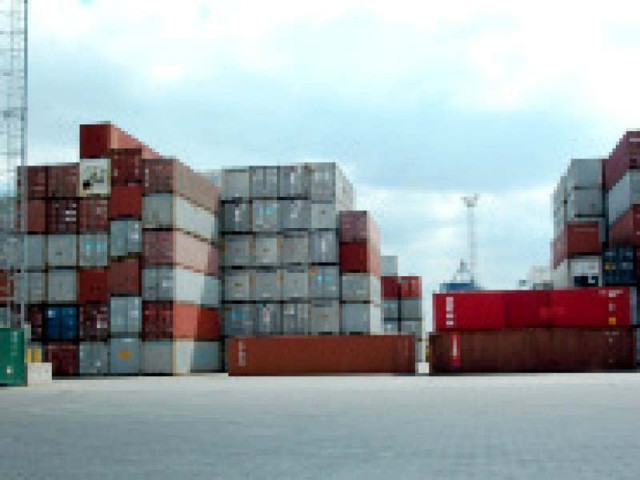Govt allows imports for EPZs
Okays import of construction material to expedite development, achieve targets

In a strategic move to expedite the development of Export Processing Zones (EPZs) and achieve ambitious export targets, the Pakistani government has taken a momentous step by allowing the import of construction material from tariff areas into EPZs in the northern region and all future EPZs. The new policy will enable transactions to be conducted in the local currency instead of foreign convertible currency, paving the way for swift colonisation and fostering an environment conducive to achieving optimal export growth.
Sources told The Express Tribune that the EPZs in the northern region, encompassing Sialkot, Gujranwala, and Risalpur, will greatly benefit from this progressive decision. However, the privilege of importing construction material will be limited to locally manufactured or produced products, signifying a boost for the domestic construction material industry.
The Industries and Production Division recently presented the proposal before the Economic Coordination Committee (ECC) of the Cabinet during a momentous meeting. The ECC, recognising the potential of this initiative to stimulate commercial activities within EPZs and significantly enhance exports, granted its approval with certain stipulations.
The establishment of Export Processing Zones Authority (EPZA) in 1980, under Ordinance IV of 1980, marked the inception of the first EPZ in Karachi in 1981. Initially, export-oriented units were primarily set up by foreign investors or non-resident Pakistanis. However, due to the unavailability of locally manufactured construction material, infrastructure development within EPZs relied heavily on imports. This process necessitated the filing of Goods Declaration and Encashment Certificate with the Zone Authority.
The slow pace of development work in EPZs, including the Sialkot Export Processing Zone (SEPZ), has been attributed to static rules and regulations that were framed almost four decades ago. These regulations, specified in SRO 1058(10)81 dated 23/09/1981 and SRO.214 (KE)/94 dated 21-11-1994, have hindered the progress of EPZs, particularly SEPZ. To address this issue, the government emphasises the importance of relying on locally produced construction materials, such as iron, steel, cement, ceramics, and other components, to conserve foreign exchange reserves and support industries within Pakistan’s tariff area.
The push for amendments in relevant SROs was initiated following a request from the Sialkot Chamber of Commerce & Industry (SCCI) to the prime minister on June 16, 2022. The SCCI sought ease of doing business and greater facilitation for the entry of construction materials into the Sialkot EPZ, aiming to minimise foreign exchange exposure. Consultations were held to arrive at a consensus, and it was decided that necessary amendments should be made in the relevant clauses of the SROs.
Views and comments on the proposed amendments were sought from concerned stakeholders, including the Federal Board of Revenue (FBR), Ministry of Commerce, and the State Bank of Pakistan (SBP). The FBR and Ministry of Commerce concurred with the proposed amendments and further recommended that the same provisions be extended to all EPZs in the Northern Region (Sialkot, Gujranwala, and Risalpur) facing similar challenges, as well as to all prospective EPZs.
However, the SBP was not in favour of the proposed amendments, stating that issues faced by resident companies could be resolved by adhering to the existing equity investment abroad policy, eliminating the need for changes to EPZA rules. Despite this, the Law and Justice Division vetted the draft notifications for amending the relevant SROs.
To realise the vision of expedited colonisation and enhanced export potential, the Industries & Production Division proposed amendments in EZPA Rules, 1981, and EPZS (Control of Entry and Exit of Persons and Goods) Regulations, 1994. These amendments, outlined in draft Notifications placed at Annex-VIII & IX, respectively, will enable the import of construction material from tariff areas into EPZs in the northern region, including Sialkot, Gujranwala, and Risalpur, as well as into all future EPZs. The transactions will be conducted in local currency instead of foreign convertible currency.
The ECC was informed that the summary was submitted on May 18, 2023, for consideration by the Cabinet Committee for Disposal of Legislative Cases (CCLC). The CCLC, in its meeting on June 8, 2023, approved the proposal, after which the prime minister expressed the desire to place the subject proposal before the ECC of the Cabinet for consideration.
As per the powers conferred under section 26 and sub-section (1) of section 27 of the EPZA Ordinance, 1980, the federal government is competent to make rules and regulations for carrying out the purpose of the ordinance.
The ECC’s approval signifies a groundbreaking development in supporting the domestic construction material industry while fostering an environment of economic resilience and sustainable growth. With a strategic focus on promoting locally manufactured products and encouraging investments within the country, this decision reflects the government’s commitment to strengthening the foundations of the national economy. The move is expected to have a positive impact on Pakistan’s overall export performance, reinforcing the nation’s position on the global economic stage.
Published in The Express Tribune, July 29th, 2023.
Like Business on Facebook, follow @TribuneBiz on Twitter to stay informed and join in the conversation.



















COMMENTS
Comments are moderated and generally will be posted if they are on-topic and not abusive.
For more information, please see our Comments FAQ